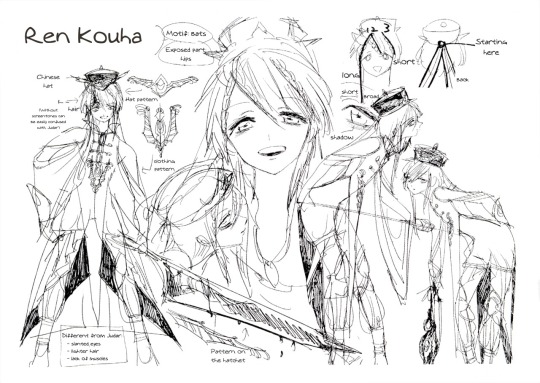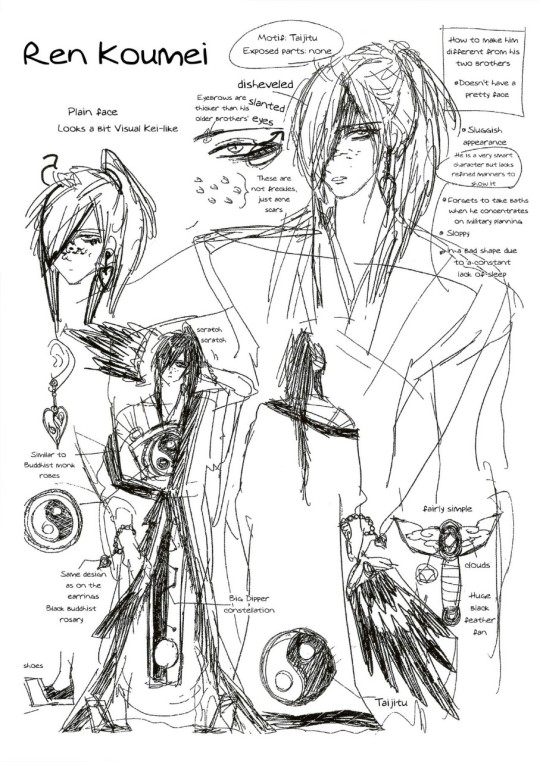I will protect my country, no matter how much I have to dirty my hands. [ Independed Kouen Ren rp blog. | ]
Don't wanna be here? Send us removal request.
Quote
I always look at the Earth or the Heavens because nothing in-between satisfies me.
Adam Zucconi
2K notes
·
View notes
Photo



Magi Week of Magic - Day 5: Imperial Family ↳ Kou Empire
114 notes
·
View notes
Text

"Who allowed that in Balbadd?"
2 notes
·
View notes
Text

"Get to the point."

﴾✺﴿— ❝ Attack you? More like I showed up to tell you something important. You should thank me, Kouen. Or are you just mad because I didn’t choose you to become my King? ❞
6 notes
·
View notes
Quote
Beware; for I am fearless, and therefore powerful.
Mary Shelley, Frankenstein
3K notes
·
View notes
Text

"Your clothes. I have seen almost every corner of this earth and have yet to encounter tribe or country where they wear those--- now I know you are not from Kou or Reim so where do you come from?"

"No…I’m not from around here…Why do you ask?"
5 notes
·
View notes
Text

"It's fine. Unfortunately I do not know where he is either, have you tried with Koumei already?"

"Oh, so sorry to bother you lord Kouen, I thought he was with you. I do hope I didn’t disturb you."
4 notes
·
View notes
Text

"Normal terms? You have about 20 seconds to explain yourself before I want you out. There are no normal terms here, not since you decided to attack me at the Summit."

﴾✺﴿— ❝ There’s no need for such a scary face. Besides, I meant on more… ‘normal' terms. ❞
6 notes
·
View notes
Photo


Connecting the world vs. unifying it: Sinbad and Kouen’s competing ideologies
One of Magi’s most compelling aspects is its willingness to grapple with enormous moral dilemmas with which governments in real life struggle. I’m biased, but I think Ohtaka conveys surprising nuance with her discussion of the question of world peace. Is unifying the world, à la the Kou Empire, an effective way of ending all conflict? Is it an ethical way? Is Sinbad, who strives to create alliances and understanding between different nation-states, both better and more moral?
The Kou Empire’s ideology is cutthroat, has been attempted in real life, and is ultimately ineffective.
Ohtaka, being aware of real life examples of the Kou Empire’s ideology, is well aware of its ethical and practical pitfalls. In the earlier arcs, we are given plenty of reasons to despise the Kou Empire, starting with slavery:
Slavery is a huge moral problem for Kouen’s ideology.

This is an extremely important panel that gives us a lot of insight into the workings of the Kou Empire:
Balbadd, and most likely the rest of the Kou Empire, needs slaves for the high quality of life for its “citizens”. Slavery is an economically necessary component of the Empire, which is not only true to Magi (for example…).
Of course, slaves, whom are mostly conquered peoples (“a different race from the north” - not so different from the barbarians of the Kouga Clan, right? Not so different from history, right?), are not considered citizens, which is why Kou’s nobility can get away with this argument.
Importantly, this former point means that slavery most likely always occurs along racialised/cultural lines in the Kou Empire.
And slavery is a tool for oppression - a way to “educate the children” about the Kou Empire.
Okay, so this is clearly shaping up to look like a complete nightmare. From the get-go in the Kouga Clan arc, we never liked the Kou Empire because of slavery, and so far Ch. 207 is confirming our worst fears.”But wait!” you say. “Koumei told us that their system of slavery is ethical! They’re freed after five years!”
Well, there are a few issues with Koumei’s famous speech. Koumei is absolutely fooling himself if he believes that slaves aren’t regularly abused and neglected, like the kid in Ch. 205, and might not even live long enough to be freed. He’s lying to himself if he believes that the Kou Empire does not create economic incentive for illegal slavery & abuse, as in the Kouga Clan arc. He is dishonest when he says that his “Brother and King” is doing good for the countries they’ve captured: as though cultural genocide, slavery, censorship, and marginalisation of conquered peoples are good things.
Koumei knows that he’s fooling himself too. He, himself, calls these things “tedious systems that bind people”, “contradiction of stopping wars by repeating wars”, and “irrational slavery system”. This oppressive and juxtaposing language that he uses is important: he knows his government is cruel to its populace, but he excuses it by saying that “it’ll be better for them in the long run; we are bringing peace”. Koumei is echoing the cognitive dissonance of real-world empires that justified genocide, slavery, and cultural suppression by arguments of “civilising barbarians and bringing peace”. What he is spouting is purely imperialist apologia. (This is superb writing on Ohtaka’s part, and I cannot stress this enough. This makes the horrors, the benefits, and the heartbreaking contradictions of imperialism/colonialism - which we experience through Alibaba - in this manga into something real.)
Ohtaka even cleverly parallels Manifest Destisny and similar concepts: instead of God saying that this Empire should inherit the Earth, it is Kouen and the Kou Empire inheriting Solomon’s Will. Kouen and Koumei have built up strong psychological and moral excuses for reprehensible actions… but these excuses do not fully hold. And that’s why Koumei freezes up so badly when Alibaba, who has lived alongside the impoverished, screams that he cannot cast away weaker beings for the greater good. “Good job,” Kouen replies. “You said your piece shamelessly.” He insults Alibaba, but not even the Crown Prince gives him a real response.
Even though colonialism has been thoroughly picked apart by both Ohtaka and the real world, neo-colonialism is something that is very much alive.
Enter Sinbad. I think this is where Magi becomes truly fascinating. Sinbad’s Seven Seas Alliance is clearly a parallel of our current preferred model of mediating international relations: the United Nations. His ideology is the antithesis to Unified Ideology. Keep all the different cultures, countries, and peoples, he says. Avoid war, he says. We can resolve conflict peacefully, he says. Don’t meddle in other countries’ internal affairs, he says. There should be no single man leading the world.
When we are first introduced to King Sinbad, Ohtaka shows us his ideology and it looks like a glorious dream in comparison to the institutional violence of the Kou Empire. Hell yeah, you say. I’m on board with this hot piece of ass! This is quite brilliant on Ohtaka’s part, because this is exactly the type of attitude we have to real world politics. But is it really so morally correct? Is it really so effective? From there, Ohtaka begins brutally deconstructing Sinbad as a King’s Candidate, along with the rest of his ideology.
Sinbad uses “dirty tricks and methods” for the sake of Sindria. Dirty tricks and methods are the only way that his dream will ever be realised.

The first hint we are given as to Sinbad’s true nature is his manipulation of Kougyoku, Aladdin, Hakuryuu, Morgiana, and Aladdin. This gets revealed fully in the later chapters, when we see Sinbad literally using Kougyoku as an unwitting puppet spy! And who can blame him? Against a force like the Kou Empire, which is unabashedly trying to conquer & enslave the whole goddamn world, what else is King Sinbad supposed to do? From a practical perspective, King Sinbad is only doing what is necessary.
But he’s doing more than just manipulating a young woman with a crush on him. Sinbad is engaging in the kind of subversive political violence that he swore to turn his back on when he was fourteen. Let me outline some of this:
Just like the Kou Empire, he intervenes unnecessarily in foreign countries. When Kou meddled in Balbadd and Magnostadt, Sinbad did the exact same in both countries. He was just better at playing the role of the “savior”. (“I’m helping Alibaba save his homeland,” he says. “I can’t let Magnostadt develop without my supervision, as my General Yamuraiha is from there.”) And in Magnostadt, he got his prize, and widened Sindria’s sphere of influence.
Although he claims to believe in a world where there is no ultimate ruler, King Sinbad and his Generals clearly want Sindria to be at the top of the political hierarchy:

Lastly and most importantly, Sinbad is ultimately sympathetic because he is a professed enemy of Al-Thamen, the “Big Bad” of Magi… but he is against them because he is a hero, or is it because it is convenient? Well, Muu Alexius pretty much tells us the answer:

During Aladdin’s World Summit essentially paints Kouen and his Empire as a villain because of one extremist group, Al-Thamen, that has entrenched itself into the Empire’s ruling dynasty. To be fair, Sinbad makes valid points about how evil Al-Thamen is. But to him, in the context of the World Summit, this is simply a matter of convenience. Ohtaka even makes it clear just how useful Al-Thamen is for Sindria’s national security:

Sinbad is not some altruistic hero fighting against the destruction of the world. Sinbad is fighting the destruction of the world because it is convenient.
Ah! Sindria is a country that claims to be peaceful and neutral, but ultimately seeks to control and influence other territories, assert itself as the dominant world power, and demonises an opposing nation by one of its extremist, minority factions. It can therefore paint itself as a benevolent power. That doesn’t sound familiar at all!
Chilling, isn’t it? The character who started out as Alibaba’s main ally, as our spokesperson against the brutality of the Kou Empire, is ultimately turning out not to be too different from what we thought was the main villain of the series.

(Brought to you by the same person who wrote that giant theory about Sinbad’s ultimate role as a villain. He’s one of my favourite characters, but goddamn!)
407 notes
·
View notes
Text

"Our last meeting was at the Summit, no more than a few days have passed since then."

﴾✺﴿— ❝ Come on now Kouen, don’t be like that. It’s been how long & that’s how you great me? ❞
6 notes
·
View notes
Text
Did most intro's & all replies but I'm still really really sick. If anyone else wants an intro you can like this, or even jump in my ask to discuss plots!
0 notes
Photo



Magi concept art of the Ren Brothers ♥ 1. Kouha 2. Koumei 3. Kouen
836 notes
·
View notes
Text

"I doubt you have come here just for pleasantries so make it quick, Judal. I'm not in the mood for jokes."
6 notes
·
View notes




